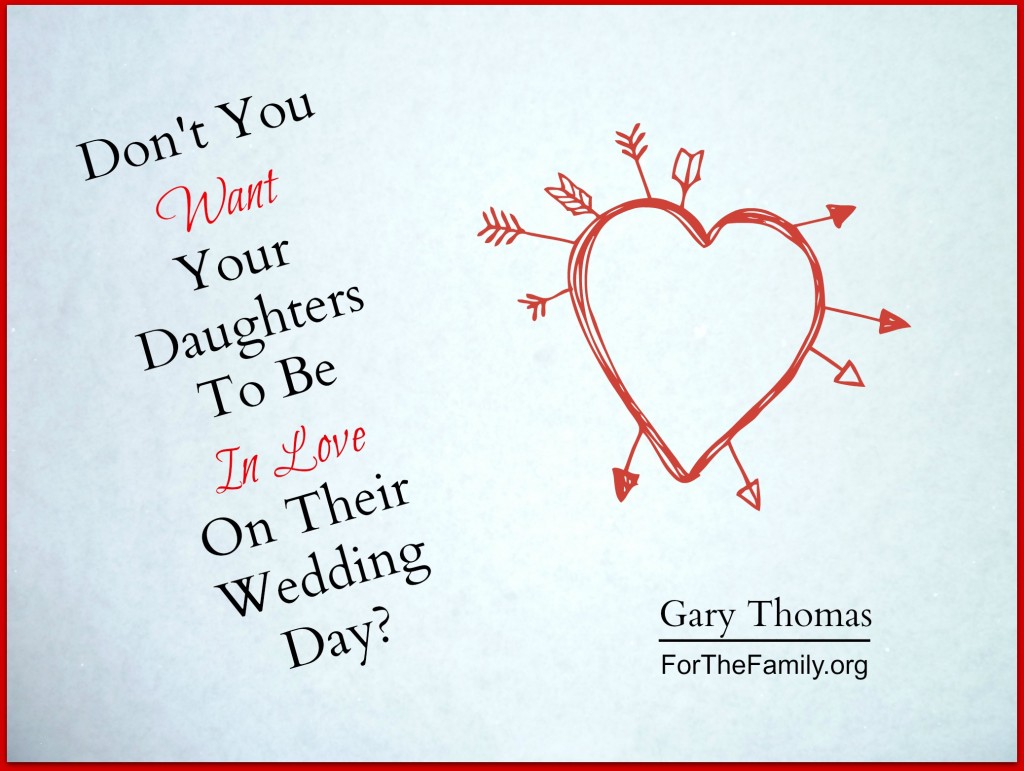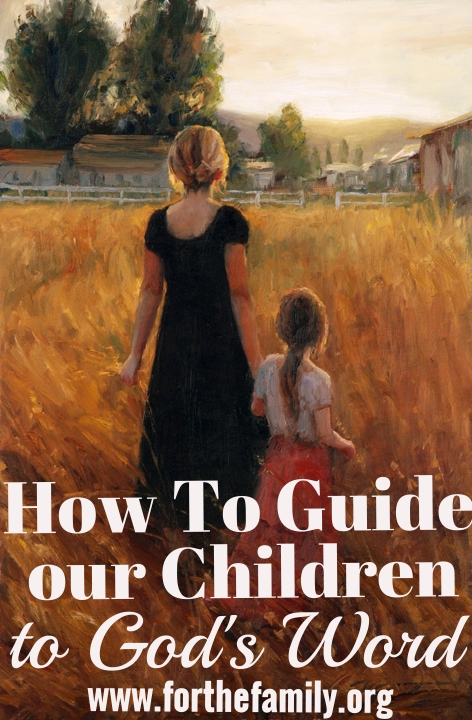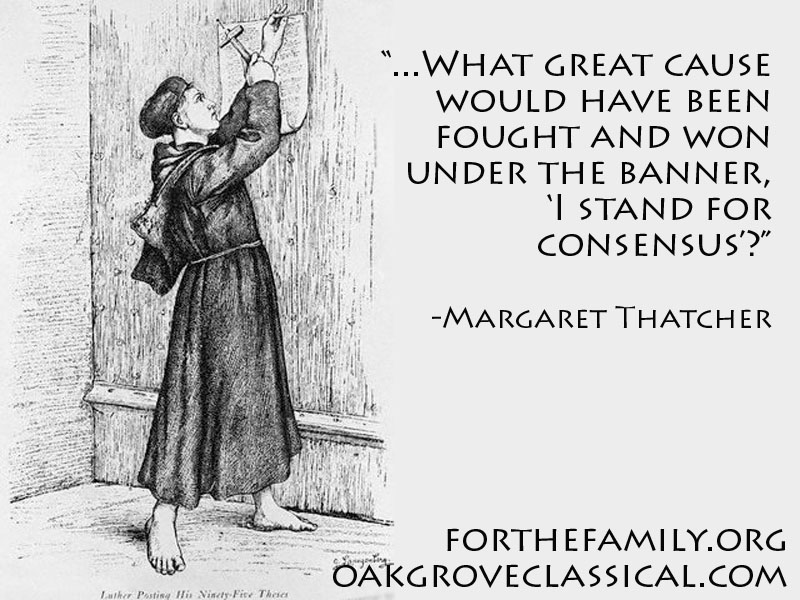Don’t You Want Your Daughters to Be in Love on Their Wedding Day?
 If marriage lasted for twelve to eighteen months, I’d be a big fan of infatuation. (Those who study the brain tell us that’s the average duration of an intense infatuation). But since infatuation is so short-lived, I’m insistent and unapologetic when I talk to singles that infatuation is a pathetically poor reason to get married and an equally poor reason not to consider marrying someone — which sounds even more radical.
If marriage lasted for twelve to eighteen months, I’d be a big fan of infatuation. (Those who study the brain tell us that’s the average duration of an intense infatuation). But since infatuation is so short-lived, I’m insistent and unapologetic when I talk to singles that infatuation is a pathetically poor reason to get married and an equally poor reason not to consider marrying someone — which sounds even more radical.
So the young woman’s plaintive question following my talk on The Sacred Search — “Don’t you want your daughters to be in love on their wedding day?”— was one last attempt to hold on to a myth that she felt I had just shattered.
I get it. Hollywood has created such a wildly romantic scenario, complete with music that crescendos as the couple waltzes out of the church, that it’s hard not to yearn for and even celebrate that. And if that is the scenario on the wedding day for one of my daughters, I won’t be disappointed… and I wouldn’t say it’s not real. It is real, in its own way. But it’s just the beginning of the story.
Here’s why I didn’t ultimately answer this young woman’s question in the way she was hoping: the same people who insist on a certain level of being “in love” to get married are the very people who, five years down the road, are more likely to leave their marriage because they no longer feel in love. They’ll say what counselors hear so often: “I still love him, I’m just no longer ‘in love’ with him.”
It makes sense, doesn’t it? If the main reason you’re getting married is because you’re “in love,” what happens when the infatuation fades and you don’t feel that same “in love” feeling? What’s going to keep you in the marriage then?
Neurologically, our capacity to feel “in love” is determined by a number of particular factors: our sense of security, self-esteem, neurological makeup, past experiences and other factors. Hollywood telling us we should feel a certain way on our wedding day is like a late-night infomercial telling us five minutes a day with their hundred-dollar machine will give us six-pack abs. Maybe, for some, but for most of us? Not a chance.
That’s why whether or not my daughter feels “in love” on her wedding day won’t be my first concern. I know this sounds radical because it goes against every message most young women have heard their entire lives.
But whether my daughter feels intensely “in love” on her wedding day doesn’t concern me nearly as much—not half as much—as the fact that she’s walking down the aisle to marry a man whose faith in God inspires her; whose character makes her want to be more like him; whose sense of humor seasons her days; who will fight and die for his family, refusing to let hobby or vocation get in the way of being a fantastic dad; who will be a rock if she gets sick, convincingly telling her how beautiful she looks as a bald chemo patient or how strong she is when arthritis makes it painful to get out of bed; whose prayers will sustain her, whose words will encourage her, whose knowledge of Scripture will instruct her, whose hands will work to provide for her (and never, not once, threaten her or harm her); whose unselfishness will give her many pleasurable sexual moments; whose faith will carry her and my grandkids through a life filled with pain and unpredictability.
If she’s found a man like that, I don’t care how “in love” she feels, because the qualities that sustain admiration, affection, and respect, are qualities that can grow rather than fade.
And here’s the truth: any woman who is “head over heels” in love on her wedding day won’t be — at least, not in the same way and not with the same intensity — five years from now. But that man my daughter is marrying, the one who is on a godly trajectory? If he’s seeking first the Kingdom of God and His righteousness, his faith will be deeper; his wisdom will be wider; and his love will be stronger.
If my daughter doesn’t feel giddy with love but respects this man, likes being around him, and enjoys (after marriage, of course) having sex with him, I won’t be concerned because with issues of character, the feelings will keep coming to a sufficient extent to maintain a fulfilling marriage.
And if she is bursting with feelings over a future husband I know to be selfish, lazy, narcissistic, cruel, spiritually apathetic, and emotionally stunted, I’ll do everything in my power to walk her out the back door instead of down the aisle.
So, do I want my daughters to feel “in love” on their wedding day?
Sure—in the same way I kind of hope at least one of them will have a grandchild with curly hair and a cute way of mispronouncing words: it would be fun, and it would make me smile, but in the end, it just doesn’t matter as much to me as things that are far more substantive and far more indicative of a solid, fulfilling, and spiritually fruitful marriage.
Blessings,
Gary







Thank you so much for this article! I felt like something was wrong in my relationship because I didn’t have that blinded-by-love feeling. I have known my man for 15 years and been dating for 1. We are so familiar with each other that I am excited and happy to see him but don’t have that giddy infatuation that I’ve had with other boyfriends in the past. Thank you for giving me peace of mind.
This is kind of sad. Being in love does not mean that the object of a girl’s affection might be lazy or cruel; giddy feelings of love and deep respect are not mutually exclusive! I was head over heels in love when I married a strong, steady, hard-working, responsible, wise, Godly man. Sure, that intense infatuation phase does not last…but that we had it does not mean that we have had a weak marriage that was more susceptible to divorce. It’s been just 30 years since we fell “in love” and 27 years since we married. My memories of those early years are precious, even though our love today, after 5 children and all the usual ups and downs of life, is of course much deeper and stronger than it was on our wedding day. I still feel giddy and “in love” from time to time and I am thankful for it! I want my daughters and son to marry the whole package, like I did! I knew several Godly men who were worthy of my respect when I was young…but what could possibly have been wrong with my dating and marrying the one who thrilled me?
You sound blessed, indeed. There is nothing wrong with feeling “in love” and much right with it–God created our brains, after all. It is perfectly possible to fall in love with someone who would be a stupendous marital match, as it appears you did. I’m just saying it’s foolish to get married for primarily that reason and for some, foolish to not get married because they don’t have that feeling (Not everybody is capable of experiencing the same kind or level of infatuation, and I wouldn’t want them to think they are “settling.”) Many who make feelings of infatuation the primary factor make very poor choices. And as you’ve stated, while infatuation continues to “re-visit” us, it’s not the same as the years pass, so it’s relevance for lifelong marital satisfaction is suspect, at best.
I guess I only half agree with you. Yes, it would be foolish to marry only because you feel in love. After we had been dating a while, we went through a period of what I like to call negotiations We discussed money and debt, whether or not I would work if we had children, where we would live, how we would handle his Mom (she ended up living with us for 9 years), etc. No, being in love is not enough. But is there some scriptural principle that would encourage me to believe that it is unnecessary? That just marrying a strong Christian is enough? Comments on our brain and neurology sort of remind me of some evolutionary psychology based studies I have seen. I am not speaking of the brain, but of the heart. I may well be wrong, but I would like some scriptural foundation to consider.
Liza, my reply would be this: when you ask for Scriptural support that romantic feelings aren’t necessary for marriage, I’d ask where in the Bible you find that they are? When telling men to choose a wife in Prov. 31, the Bible stresses character, not feelings. Not even a mention of feelings! And when Paul talks to both men and women in 1 Corinthians 7, it’s all about wanting to pursue a holy life and how singleness could be an impediment for some. So the motivation is holiness, not romanticism. I’m not an evolutionary psychologist by ANY means, but I do hold to the sufficiency of Scripture. And if ongoing, intense romantic feelings were essential for a wise marital choice, I think the Bible would tell us that. Its silence speaks loudly to me that perhaps we’ve been sold a lie. Many couples get divorced because the feelings have faded–but that means they assume those feelings should stay and are necessary. To me, this is a clever “bait and switch” tactic to get people to marry for the wrong reasons and then discard their marriage for relatively trivial reasons. Don’t get me wrong–I think my wife and I feel as intensely for each other as ever, but we’re recent empty nesters, and that’s not uncommon. I thank God for romantic feelings, but I believe godliness and purpose sustain true affection and respect, which can grow. Feelings are just too fickle to base a marriage on.
Now I feel a bit silly. I had no idea who wrote this post – I saw it on Pinterest I can see that you have written a book about this topic, as well as Sacred Marriage, a book about which I have only heard good things. I have put both books on my list and look forward to reading more. I have always assumed that those in love feelings were part of a good foundation for marriage. I still don’t really understand what you mean by our brains and neurology (I am presuming that you are not talking about evolutionary psychology!), but I am interested in learning more. Our oldest daughters are 23 and 21 and,naturally, this is an important topic in our home!